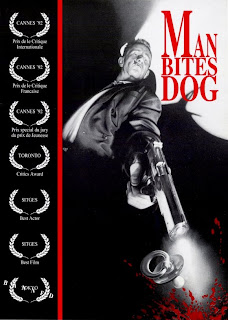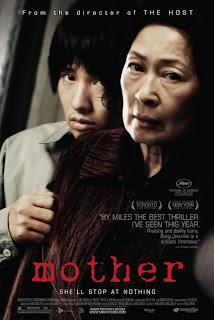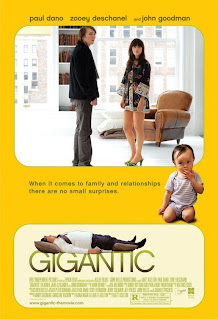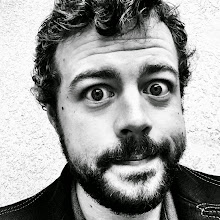
Harry Potter & The Deathly Hallows: Part 1
Directed by: David Yates
Starring: Daniel Radcliffe, Emma Watson, Rupert Grint
Released: 2010
Country of Origin: UK/USA
Runtime: 146 min.
I've instated an unwritten rule in the last couple years regarding how I approach film adaptations of books: if an adaption is on the horizon, and I intend to see it, most of the time I will hold off on reading the book. A film should be judged on its own merits, without preconceived notions of how events should play out on screen. I find it completely impossible to do this if I've read the source material, and it's particularly hard if I loved the book (or comic). Granted, I will inevitably miss out on some very enjoyable reads, but I'm far more loyal to celluloid than I am to the written word. Personally, I'd rather see more movies based on original material than adaptations or the multitude of re-makes, re-boots, and re-imaginings that are overflowing at the box-office, but I don't see this trend changing anytime soon. I'm not saying they shouldn't happen, or that you can't make something brilliant based on someone else's ideas, there are many examples of this done right and some are even better than what came before. For example: I view Christopher Nolan's vision of The Dark Knight as better than anything else in the Batman universe. But it's sad that filmmakers don't strive to create their own unique universes more often.
I am by no means a hardcore Potter fan. I've read the first three books in the Harry Potter franchise, and I may read the rest, but as I've already said, I'd rather wait until the film series comes to a close. I've enjoyed most of the films so far, with the exception of the first two, which were terrible. I feel the series has suffered a bit as a whole by the near-constant changing of directors, having one director would have provided some cohesion and a singular vision which I think would have benefited the series greatly. I completely understand how nearly impossible that would have been, I can't imagine anyone willing to dedicate over ten years to a single project. David Yates has been the sole director since The Order of The Phoenix, and his films have been the best entries thus far. He seems to have a better handle on the darker aspects of the story, while still making them enjoyable and exciting to the passionate flocks of younger fans. Since most people are already aware of the ongoing sage of Harry Potter, I'm going to skip any talk of the details. Either you know whats going on and what's come before, or this is a story you just don't care about.
I went into The Deathly Hallows with some serious worries, mostly due to the studio's decision to split the last book into two films. The strategy makes logical and economic sense, few people are willing to sit through a five-hour film, and why limit your profits to one film when you can split it up and make audiences pay twice? However the split makes the film a completely unsatisfying experience. This doesn't mean it's not a great film, it might be. But without seeing the second half it's impossible to tell. The added knowledge that I won't see the conclusion for another eight months makes it even harder to appreciate Part 1. The first half is not able to stand on its own, it's clear that it needs the rest of the story to work. The biggest problem is the "end": while there was a big emotional climax that was used to close out this half, it was not enough to provide an acceptable finale to a 2 1/2 hour film. I felt extremely cheated when the credits began to roll. As unhappy as I was, I understand it's impossible to judge The Deathly Hallows based on what I saw. That would be like putting a book down half-way and then proclaiming that it was a horrible novel.
Despite everything I just said, I think this might end up being one of the best films in the series. Every aspect is handled with a high standard of quality. It's clear David Yates has become more comfortable and skilled with each film he has worked on. Daniel Radcliffe, Emma Watson, and Rupert Grint have all grown up to be excellent actors and truly embody their characters. I feel their casting ten years ago was one of the single smartest choices that the folks behind the films have made. The rest of the cast is filled out with what seems to be a greatest hits collection of the best British actors working today. There is also an extremely awesome animated sequence that tells the story behind The Deathly Hallows.
It's clear that the books have much more going on than what is shown on screen. I don't know exactly what I'm missing, but often these films feel extremely gutted. Some events seem glossed over, and leaves those who haven't read the books a little lost. Most of the time, this isn't something that causes much trouble, but it's still evident that we aren't getting all the details.
FINAL VERDICT: You probably already know if this is something you're going to see. I can't really say what my verdict is with this movie, it's not a complete film. It's got a rather long run-time, but I was never aware of that fact. When the film ended, it seemed too short. I was ready for more, and would've been completely fine with staying another 2 1/2 hours to see it through to the end. I guess that's the best and only accurate factor on which I can judge this. I was pissed when it was over, and felt like someone shut the movie off just as it was getting good. It had me and I didn't want it to let go. I can't completely judge it now, but it has the makings of a truly exciting film, once it's paired with the end. I just wish that there wasn't an eight month wait until Part 2 arrives.











